庞德(Ezra Pound)诗选(汉译)
- 格式:doc
- 大小:34.00 KB
- 文档页数:9
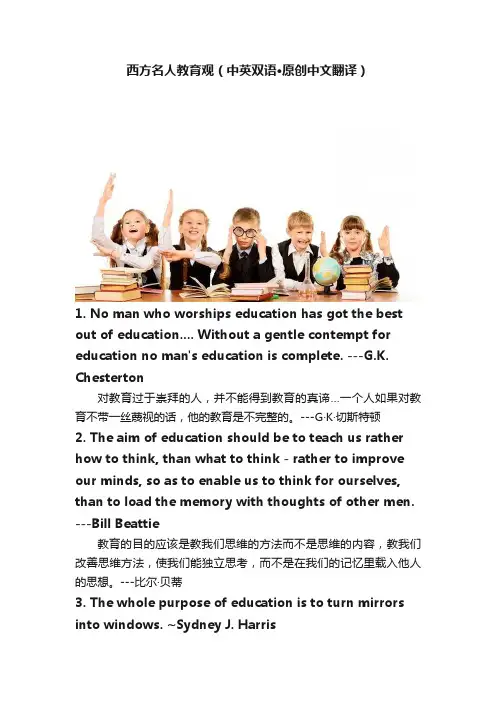
西方名人教育观(中英双语·原创中文翻译)1. No man who worships education has got the best out of education.... Without a gentle contempt for education no man's education is complete. ---G.K. Chesterton对教育过于崇拜的人,并不能得到教育的真谛…一个人如果对教育不带一丝蔑视的话,他的教育是不完整的。
---G·K·切斯特顿2. The aim of education should be to teach us rather how to think, than what to think - rather to improve our minds, so as to enable us to think for ourselves, than to load the memory with thoughts of other men. ---Bill Beattie教育的目的应该是教我们思维的方法而不是思维的内容,教我们改善思维方法,使我们能独立思考,而不是在我们的记忆里载入他人的思想。
---比尔·贝蒂3. The whole purpose of education is to turn mirrors into windows. ~Sydney J. Harris教育的全部目的就是把镜子变成窗户。
---斯尼·J·哈里斯4. Education is what remains after one has forgotten what one has learned in school. ---Albert Einstein 如果我们将学校学过的东西忘得一干二净,剩下的东西就是教育的本质。

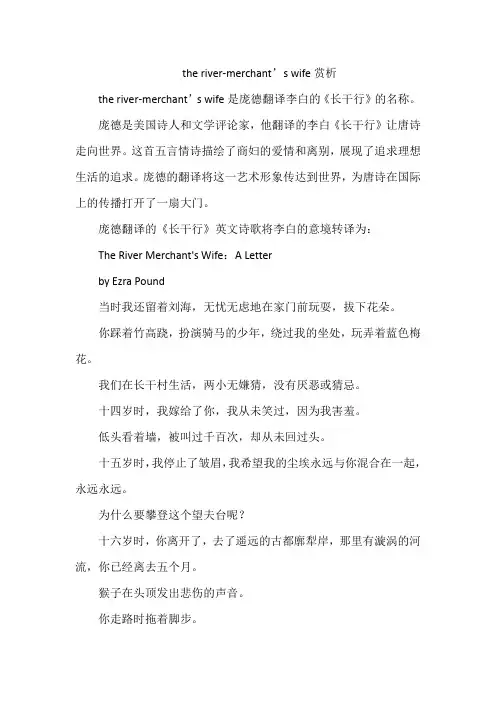
the river-merchant’s wife赏析the river-merchant’s wife是庞德翻译李白的《长干行》的名称。
庞德是美国诗人和文学评论家,他翻译的李白《长干行》让唐诗走向世界。
这首五言情诗描绘了商妇的爱情和离别,展现了追求理想生活的追求。
庞德的翻译将这一艺术形象传达到世界,为唐诗在国际上的传播打开了一扇大门。
庞德翻译的《长干行》英文诗歌将李白的意境转译为:The River Merchant's Wife:A Letterby Ezra Pound当时我还留着刘海,无忧无虑地在家门前玩耍,拔下花朵。
你踩着竹高跷,扮演骑马的少年,绕过我的坐处,玩弄着蓝色梅花。
我们在长干村生活,两小无嫌猜,没有厌恶或猜忌。
十四岁时,我嫁给了你,我从未笑过,因为我害羞。
低头看着墙,被叫过千百次,却从未回过头。
十五岁时,我停止了皱眉,我希望我的尘埃永远与你混合在一起,永远永远。
为什么要攀登这个望夫台呢?十六岁时,你离开了,去了遥远的古都廓犁岸,那里有漩涡的河流,你已经离去五个月。
猴子在头顶发出悲伤的声音。
你走路时拖着脚步。
现在,大门前苔藓丛生,各种各样的苔藓,深得不能清理!这个秋天,叶子早早地飘落,随风飘扬。
西园的草地上,八月里蝴蝶翩翩起舞,两只相互飞舞。
这让我受伤了,我变老了。
如果你正从江河的狭窄处下来,事先告诉我,我会走出去迎接你,一直到达到长风沙。
庞德的翻译虽有不足,但成功将唐诗引入世界,让更多外国人了解和喜爱我国古典诗词文化。
这不仅是对唐诗的一次成功翻译,更是文化交流的一座桥梁,为中西方诗歌的互相借鉴铺平了道路。
尽管语言和文化存在隔阂,庞德的翻译成就斐然。
比如,“郎骑竹马来,绕床弄青梅”这句,形容小时候的游乐玩耍,表达男孩与女孩间的童趣,庞德却未能完全理解。
翻译或许可以更为贴切:我拔了一束花,在大门前嬉戏。
你骑着竹马而来,绕着床弄弄青梅。
庞德的杰出翻译功绩,让世界看到了唐诗的卓越之美。

东学西渐语境下论庞德汉诗英译内容摘要:通过翻译、改写与创作,庞德从汉语古典诗歌中吸取异质养分,既做媒婆又做处女,历史地成为崭新时代东学西渐的先行者。
他的翻译思想激励并提升了他的诗歌创作,为诗歌翻译的本质和理想重新下了定义,“中国诗歌之发明者”庞德如愿以偿地将“东方杏花”带到了西方,使中国诗歌成为激发现代派诗人创作灵感的源泉,促进了英语诗歌从传统向现代过渡,做出了对英语诗歌的最持久的贡献。
关键词:东学西渐庞德汉诗英译创造性一庞德主张诗歌当以凝练的意象和简洁的语言表征诗人的理性和感情,诗人应当不断地创造意象,把直观留给诗歌,并借助意象的“叠加”(superposition)和“并置”(juxtaposition)等艺术手段,将读者当作诗歌诠释的主体融入诗歌的解读,完成诗歌意义的建构。
在庞德看来,中国古典诗歌注重意象,精炼直接,包含着深邃的东方古典哲学思想,给意象主义者们提供了良好的创作范例,对美国现代诗歌来说,“是一个宝库,今后一个世纪将从中寻找推动力。
”通过研读费诺罗萨的遗稿,庞德发现,中国诗歌所注重的“意象”、“神韵”、“简洁”、“音乐”等主张与他领导的英美意象主义诗歌运动的诗学观不谋而合,尤其在读到遗稿中的“汉字乃绘画之速写,一行中国诗就是一行速写画”,“一个汉字就是一个意象(animage),一首诗就是一串意象”时,顿有一种“醍醐灌顶,茅塞顿开”之感,并视其为“宝贵财富”,随后便投入到中国诗的翻译之中。
庞德主张,诗歌翻译不应过于强调字词直译,而应更多地再现这一人类感情的方程式背隐的情愫。
“字面翻译无法再现原词语中的美。
”这就要求译者不仅翻译词和精神,并且要有“认同感”,“在某种意义上必须认同和意识到古人的精神内容,并从他们的思想与言语中吸取某些时髦的东西。
”庞德的翻译作品中运用了移译、引用和析字法,求的是喻象,借汉语文字形象构造来表明其意象主义诗歌的创作理念:诗应该富含意象。
《华夏集》的翻译与诗歌创作实践表明,庞德十分清楚文学翻译与文学创作的内在联系,他声称“文学的伟大时代通常都是翻译的伟大时代”,翻译常常带来“文学的创新”。
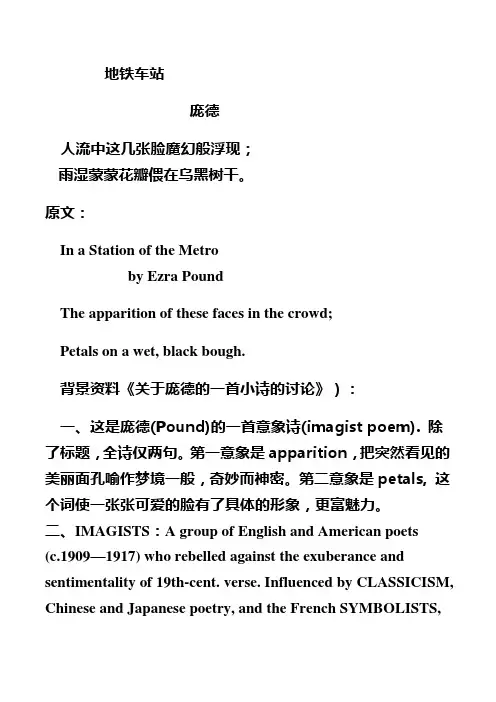
地铁车站庞德人流中这几张脸魔幻般浮现;雨湿蒙蒙花瓣偎在乌黑树干。
原文:In a Station of the Metroby Ezra PoundThe apparition of these faces in the crowd;Petals on a wet, black bough.背景资料《关于庞德的一首小诗的讨论》):一、这是庞德(Pound)的一首意象诗(imagist poem). 除了标题,全诗仅两句。
第一意象是apparition,把突然看见的美丽面孔喻作梦境一般,奇妙而神密。
第二意象是petals, 这个词使一张张可爱的脸有了具体的形象,更富魅力。
二、IMAGISTS:A group of English and American poets(c.1909—1917) who rebelled against the exuberance and sentimentality of 19th-cent. verse. Influenced by CLASSICISM, Chinese and Japanese poetry, and the French SYMBOLISTS,they advocated a hard, clear, concentrated poetry, free of artificialities and replete with specific physical analogies. The group included Ezra POUND, Richard ALDINGTON, Amy LOWELL, and Hilda DOOLITTLE.三、1.这首诗据Pound自己记载,是一个下雨的晚上,他走出巴黎的一个地铁站,突然看到许多女人和儿童漂亮的脸庞,不知如何表达内心的感受,后来却发现可以用色彩表达感情。
开始他写了30行,不满意,半年后改为15行,又过了一年终于成了这首类似于日本俳句的2行诗。
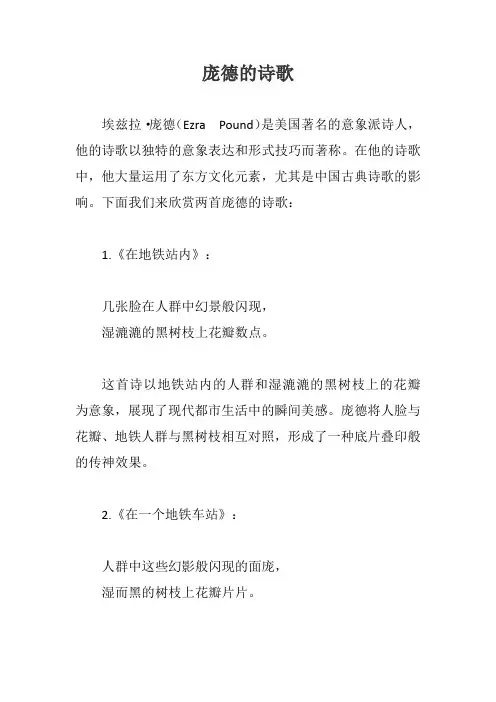
庞德的诗歌
埃兹拉·庞德(Ezra Pound)是美国著名的意象派诗人,他的诗歌以独特的意象表达和形式技巧而著称。
在他的诗歌中,他大量运用了东方文化元素,尤其是中国古典诗歌的影响。
下面我们来欣赏两首庞德的诗歌:
1.《在地铁站内》:
几张脸在人群中幻景般闪现,
湿漉漉的黑树枝上花瓣数点。
这首诗以地铁站内的人群和湿漉漉的黑树枝上的花瓣为意象,展现了现代都市生活中的瞬间美感。
庞德将人脸与花瓣、地铁人群与黑树枝相互对照,形成了一种底片叠印般的传神效果。
2.《在一个地铁车站》:
人群中这些幻影般闪现的面庞,
湿而黑的树枝上花瓣片片。
这首诗同样是庞德的经典之作,以简短的两行诗描绘了地铁站内的人群和树枝上的花瓣。
通过这种形式,庞德成功地捕捉到了现代都市生活的韵味和东方美学意境。
庞德的诗歌以意象派手法为特点,强调诗人对生活场景的敏锐捕捉和独特表达。
他的诗歌风格独具一格,为美国诗歌的发展做出了重要贡献。

i want to hold your hand翻译i want to hold your hand翻译:我想握你的手;我想握住你的手。
我愿执子之手,永不放开英文:I would like to hold your hands and never let it go.(其实mengdehuixiang的就可以了,我写的和他一样"执子之手,与子偕老"有几种经典的翻译:1.理雅各James Legge的经典翻译:For life or for death, however separated,To our wives we pleadged our word.We held their hands;---We are to grow old together with them.2.Bernhard Karlgren的翻译:In death or life (we are) separated and far apart;With you I made an agreement:I grasped your hand,Together with you I was to grow old.3.大诗人庞德Ezra Pound的翻译:To stay together till death and endfor far, for near, hand, oath, accord:Never alivewill we keep that word.4.简明版翻译:I want to hold your handand with you I will grow old.拓展资料:击鼓其镗,踊跃用兵。
土国城漕,我独南行。
从孙子仲,平陈与宋。
不我以归,忧心有忡。
爰居爰处?爰丧其马?于以求之?于林之下。
死生契阔,与子成说。
执子之手,与子偕老。
于嗟阔兮,不我活兮。
于嗟洵兮,不我信兮。
执子之手,与子共著.执子之手,与子同眠.执子之手,与子偕老.执子之手,夫复何求。
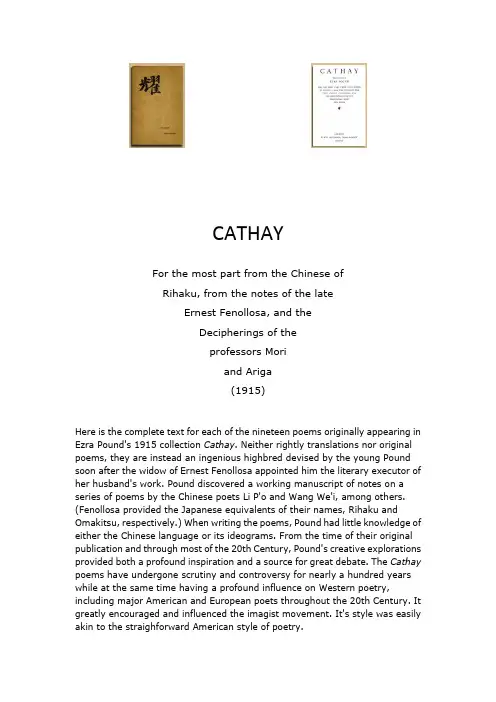
CATHAYFor the most part from the Chinese ofRihaku, from the notes of the lateErnest Fenollosa, and theDecipherings of theprofessors Moriand Ariga(1915)Here is the complete text for each of the nineteen poems originally appearing in Ezra Pound's 1915 collection Cathay. Neither rightly translations nor original poems, they are instead an ingenious highbred devised by the young Pound soon after the widow of Ernest Fenollosa appointed him the literary executor of her husband's work. Pound discovered a working manuscript of notes on a series of poems by the Chinese poets Li P'o and Wang We'i, among others. (Fenollosa provided the Japanese equivalents of their names, Rihaku and Omakitsu, respectively.) When writing the poems, Pound had little knowledge of either the Chinese language or its ideograms. From the time of their original publication and through most of the 20th Century, Pound's creative explorations provided both a profound inspiration and a source for great debate. The Cathay poems have undergone scrutiny and controversy for nearly a hundred years while at the same time having a profound influence on Western poetry, including major American and European poets throughout the 20th Century. It greatly encouraged and influenced the imagist movement. It's style was easily akin to the straighforward American style of poetry.SONG OF THE BOWMAN OF SHUHere we are, picking the first fern-shootsAnd saying: When shall we get back to our country?Here we are because we have the Ken-nin for our foemen,We have no comfort because of these Mongols.We grub the soft fern-shoots,When anyone says "Return," the others are full of sorrow. Sorrowful minds, sorrow is strong, we are hungry and thirsty. Our defense is not yet made sure, no one can let his friend return. We grub the old fern-stalks.We say: Will we be let to go back in October?There is no ease in royal affairs, we have no comfort.Our sorrow is bitter, but we would not return to our country. What flower has come into blossom?Whose chariot? The General's.Horses, his horses even, are tired. They were strong.We have no rest, three battles a month.By heaven, his horses are tired.The generals are on them, the soldiers are by them.The horses are well trained, the generals have ivory arrows and quivers ornamented with fish-skin.The enemy is swift, we must be careful.When we set out, the willows were drooping with spring,We come back in the snow,We go slowly, we are hungry and thirsty,Our mind is full of sorrow, who will know of our grief?by Bunno — Reputedly 1100 B.CTHE BEAUTIFUL TOILETBlue, blue is the grass about the riverAnd the willows have overfilled the close garden.And within, the mistress, in the midmost of her youth,White, white of face, hesitates, passing the door.Slender. she puts forth a slender hand;And she was a courtezan in the old days,And she has married a sot,Who now goes drunkenly outAnd leaves her too much alone.by Mei Sheng B.C. 140THE RIVER SONGThis boat is of shato-wood, and its gunwales are cut magnolia, Musicians with jeweled flutes and with pipes of goldFill full the sides in rows, and our wineIs rich for a thousand cups.We carry singing girls, drift with the drifting water,Yet Sennin needsA yellow stork for a charger, and all our seamenWould follow the white gulls or ride them.Kutsu's prose songHangs with the sun and moon.King So's terraced palaceis now but barren hill,But I draw pen on this bargeCausing the five peaks to tremble,And I have joy in these wordslike the joy of blue islands. (If glory could last foreverThen the waters of Han would flow northward.)And I have moped in the Emperor's garden, awaiting an order- to-write!I looked at the dragon-pond, with its willow-colored waterJust reflecting in the sky's tinge,And heard the five-score nightingales aimlessly singing.The eastern wind brings the green color into the island grasses at Yei-shu,The purple house and the crimson are full of Spring softness. South of the pond the willow-tips are half-blue and bluer,Their cords tangle in mist, against the brocade-like palace.Vine strings a hundred feet long hang down from carved railings, And high over the willows, the find birds sing to each other, and listen,Crying—'Kwan, Kuan,' for the early wind, and the feel of it.The wind bundles itself into a bluish cloud and wanders off. Over a thousand gates. over a thousand doors are the sounds of spring singing,And the Emperor is at Ko.Five clouds hang aloft, bright on the purple sky,The imperial guards come forth from the goldren house with their armor a-gleaming.The Emperor in his jeweled car goes out to inspect his flowers, He goes out to Hori, to look at the wing-flapping storks,He returns by way of Sei rock, to hear the new nightingales,For the gardens of Jo-run are full of new nightingales,Their sound is mixed in this flute,Their voice is in the twelve pipes hereby Rihaku8th Century A.D.THE RIVER MERCHANT'S WIFE: A LETTERWHILE my hair was still cut straight across my foreheadPlayed I about the front gate, pulling flowers.You came by on bamboo stilts, playing horse,You walked about my seat, playing with blue plums.And we went on living in the village of Chokan:Two small people, without dislike or suspicion.At fourteen I married My Lord you,I never laughed, being bashful.Lowering my head, I looked at the wall.Called to, a thousand times, I never looked back.At fifteen I stopped scowling,I desired my dust to be mingled with yoursForever and forever and forever.Why should I climb the look out?At sixteen you departed,You went into fat Ku-to-yen, by the river of swirling eddies,And you have been gone five months.The monkeys make sorrowful noise overhead.You dragged your feet when you went out.By the gate now, the moss is grown, the different mosses,Too deep to clear them away!The leaves fall early in autumn, in wind.The paired butterflies are already yellow with AugustOver the grass in the West garden;They hurt me. I grow older.If you are coming down through the narrows of the river Kiang, Please let me know beforehand,And I will come out to meet youAs far as Cho-fu-Sa.by RihakuPOEM BY THE BRIDGE AT TEN-SHINMarch has come to the bridge head,Peach boughs and apricot boughs hang over a thousand gates, At morning there are flowers to cut the heart,And evening drives them on the eastward-flowing waters. Petals are on the gone waters and on the going,And on the back-swirling eddies,But to-day's men are not the men of the old days,Though they hang in the same way over the bridge-rail.The sea's color moves at the dawnAnd the princes still stand in rows, about the throne,And the moon falls over the portals of Sei-go-yo,And clings to the walls and the gate-top.With head gear glittering against the cloud and sun,The lords go forth from the court, and into far borders.They ride upon dragon-like horses,Upon horses with head-trappings of yellow metal,And the streets make way for their passage.Haughty their passing,Haughty their steps as they go into great banquets,To high halls and curious food,To the perfumed air and girls dancing,To clear flutes and clear singing;To the dance of the seventy couples;To the mad chase through the gardens.Night and day are given over to pleasureAnd they think it will last a thousand autumns.Unwearying autumns.For them the yellow dogs howl portents in vain,And what are they compared to the lady Riokushu,That was cause of hate!Who among them is a man like Han-reiWho departed alone with his mistress,With her hair unbound, and he his own skiffsman!by RihakuTHE JEWEL STAIR'S GRIEVANCEThe jeweled steps are already quite white with dew,It is so late the dew soaks my gauze stockings,And I let down the crystal curtainAnd watch the moon through the clear autumnby RihakuNote.—Jewel stairs, therefore a palace. Grievance, therefore there is something to complain of. Gauze stockings, therefore a court lady, not a servant who complains. Clear autumn, there fore he has no excuse on account of the weather. Also she has come early, for the dew has not merely whitened the stairs, but soaks her stockings. The poem is especially prized because she utters no direct reproach.LAMENT OF THE FRONTIER GUARDBy the north gate, the wind blows full of sand,Lonely from the beginning of time until now!Trees fall, the grass goes yellow with autumn,I climb the towers and towersto watch out the barbarous land:Desolate castle, the sky, the wide desert.There is no wall left to this village.Bones white with a thousand frosts,High heaps, covered with trees and grass;Who brought this to pass?Who was brought the flaming imperial anger?Who has brought the army with drums and with kettle-drums?Barbarous kings.A gracious spring, turned to blood-ravenous autumn,A turmoil of wars-men, spread over the middle kingdom,Three hundred and sixty thousand,And sorrow, sorrow like rain.Sorrow to go, and sorrow, sorrow returning.Desolate, desolate fields,And no children of warfare upon them,No longer the men for offence and defense.Ah, how shall you know the dreary sorrow at the North Gate,With Rihaku's name forgottenAnd we guardsmen fed to the tigersby RihakuEXILE'S LETTERTo So-Kin of Rakuyo, ancient friend, Chancellor of Gen.Now I remember that you built me a special tavernBy the south side of the bridge at Ten-Shin.With yellow gold and white jewels we paid for the songs and laughter,And we were drunk for month after month, forgetting the kings and princes.Intelligent men came drifting in, from the sea from the west border And with them, and with you especially,There was nothing at cross-purpose,And they made nothing of sea-crossing or of mountain-crossing,If only they could be of that fellowship,And we all spoke out our hearts and minds, and without regret. And then I was sent off to South Wei,smothered in laurel groves,And you to the north of Raku-hoku,Till we had nothing but thoughts and memories in common.And then, when separation had come to its worstWe met, and travelled into Sen-GoThrough all the thirty-six folds of the turning and twisting waters, Into a valley of a thousand bright flowers,That was the first valley;And on into ten thousand valleys full of voices and pine-winds. And with silver harness and reins of gold,prostrating themselves on the ground,Out came the East of Kan foreman and his company.And there came also the 'True-man' of Shi-yo to meet me, Playing on a jeweled mouth-organ.In the storied houses of San-Ko they gave us more Sennin music, Many instruments, like the sound of young phoenix broods.The foreman of Kan-Chu, drunk, dancedbecause his long sleeves wouldn’t keep stillWith that music playing.And I, wrapped in brocade, went to sleep with my head on his lap, And my spirit so high it was all over the heavens.And before the end of the day we were scattered like stars or rain.I had to be off to So, far away over the waters,You back to your river-bridge.And your father, who was brave as a leopard,Was governor in Hei-Shu and put down the barbarian rabble.And one May he had you send for me,despite the long distance;And what with broken wheels and so on, I won’t say it wasn’thard going,Over roads twisted like sheep’s guts.And I was still going, late in the year,in the cutting wind from the North,And thinking how little you cared for the cost,and you caring enough to pay it.Then what a reception:Red jade cups, food well set on a blue jeweled table,And I was drunk, and had no thought of returning.And you would walk out with me to the western corner of the castle, To the dynastic temple, with water about it clear as blue jade,With boats floating, and the sound of mouth-organs and drums, With ripples like dragon-scales, going glass green on the water, Pleasure lasting, with courtesans going and coming withouthindrance,With the willow-flakes falling like snow,And the vermilioned girls getting drunk about sunset,And the waters a hundred feet deep reflecting green eyebrows —Eyebrows painted green are a fine sight in young moonlight, Gracefully painted—And the girls singing back at each other,Dancing in transparent brocade,And the wind lifting the song, and interrupting it,Tossing it up under the clouds.And all this comes to an end.And is not again to be met with.I went up to the court for examination,Tried Layu’s luck, offered the Choyo song,And got no promotion,and went back to the East MountainsWhite-headed.And once again, later, we met at the South bridgehead.And then the crowd broke up, you went north to San palace,And if you ask how I regret that parting:It is like the flowers falling at Spring’s end,Confused, whirled in a tangle.What is the use of talking, and there is no end of talking,There is no end of things in the heart.I call in the boy,Have him sit on his knees hereTo seal this,And I send it a thousand miles, thinking.by RihakuFOUR POEMS OF DEPARTURELight rain is on the light dustThe willows of the inn-yardWill be going greener and greener,But you, Sir, had better take wine ereyour departure,For you will have no friends about youWhen you come to the gates of Go.(Rihaku or Omakittsu) Separation on the River KiangKo-jin goes west from Ko-kaku-ro,The smoke flowers are blurred over the river.His lone sail blots the far sky.And now I see only the river,The long Kiang, reaching heaven.RihakuTaking Leave of a FriendBlue mountains to the north of the walls,White river winding about them;Here we must make separationAnd go out through a thousand miles of dead grass.Mind like a floating white cloud,Sunset like the parting of old aquaintancesWho bow over their clasped hands at a distance.Our horses neigh to each otheras we are departingRihakuLeave-taking Near ShokuThey say the roads of Sanso are steep,Sheer as the mountains.The walls rise in a man's face,Clouds grow out of the hillat his horse's bridle.Sweet trees are on the paved way of the Shin,Their trunks burst through the paving,And freshets are bursting their icein the midst of Shoku, a proud city.Men's fates are already set,There is no need of asking divinersRihaku The City of ChoanThe phoenix are at play on their terrace.The phoenix are gone, the river flows on aloneFlowers and grassCover over the dark pathwhere lay the dynastic house of the Go.The bright cloths and bright caps of the ShinAre now the base of old hills.The Three Mountains fall through the far heaven,The isle of White Heronsplits the two streams apart.Now the high clouds cover the sunAnd I can see Choan afarAnd I am sad.South-Folk in Cold CountryThe Dai horse neighs against the bleak wind of Etsu,.The birds of Etsu have no love for En, in the north,Emotion is born out of habit,*Yesterday we went out of the Wild-Goose gate,Today from the Dragon-Pen.Surprised. Desert turmoil. Sea sun.Flying snow bewilders the barbarian heaven.Lice swarm like ants over our accoutrements.Mind and spirit drive on the feathery banners.Hard fight gets no reward.Loyalty is hard to explain.Who will be sorry for General Rishogu,the swift moving,Whose white head is lost for this province?* I.e., we have been warring from one end of the empire to the other, now east, now west, on each border.Sennin Poem by KakuhakuThe red and green kingfishersflash between the orchids and clover,One bird casts its gleam on anotherGreen vines hang through the high forest,They weave a whole roof to the mountain,The lone man sits with shut speech,He purrs and pats the clear strings.He throws his heart up through the sky,He bights through the flower pistiland brings up a fine fountain.The red-pine-tree god looks at him and wonders.He rides through the purple smoke to visit the sennin,He takes 'Floating Hill'* by the sleeve,He claps his hand on the back of the great white sennin.But you, you dam'd crowd of gnats,Can you even tell the age of a turtle?* Name of sennin (spirit.)A Ballad of the Mulberry RoadThe sun rises in south east cirner of thingsTo look on the tall house of the ShinFor they have a daughter names Rafu,(pretty girl)She made the name for herself: 'Gauze Veil,'For she feeds mulberries to silkworms.She gets them by the south wall of the town.With green strings she makes the warp of her basketShe makes the shoulder-straps of her basketfrom the boughs of Ketsura,And she piles her hair up on the left side of herhead-piece.Her earring are made of pearl,Her underskirt is of green pattern-silk,Her overskirt is the same silk dyed in purple,And when men going by look at RafuThey set down their burdens,They stand and twirl their moustaches.(Fenolloso Mss., very early) Old Idea of Choan by RosoriuIThe narrow streets cut into the wide highway at Choan,Dark oxen, white horses,drag on the seven coaches with outridersThe coaches are perfumed wood,The jeweled chair is held up at the crossway,Before the royal lodge:A glitter of golden saddles, awaiting the princes;They eddy before the gate of the barons.The canopy embroidered with dragonsdrinks in and casts back the sun.Evening comes.The trappings are bordered with mist.The hundred cords of mist are spread throughdrinks in and casts back the sun.and double the trees,Night birds, and night women,Spread out their sounds through the gardens.IIBirds with flowery wing, hovering butterfliescrowd over the thousand gates,Trees that glitter like jade,terraces tinged with silver,The seed of a myriad hues,A net-work of arbors and passages and covered ways,Double towers, winged roofs,border the network of ways:A place of felicitous meeting.Riu's house stands out on the sky,with glitter of colorAs Butei of Kan made the high golden lotusto gather his dews,Before it another house which I do not know:How shall we know all the friendswhom we meet on strange roadways?To Em-mei's "The Unmoving Cloud"' Wet springtime.' says To-em-mei,' Wet spring in the garden.'IThe clouds have gathered, and gathered,and the rain falls and falls,The eight ply of the heavensare all folded into one darkness,And the wide, flat road stretches out.I stop in my room towards the East, quiet, quiet,I pat my new cask of wine.My friends are estranged, or far distant,I bow my head and stand still.IIRain, rain, and the clouds have gathered,The eight ply of the heavens are darkness,The flat land is turned into river.'Wine, wine. here is wine!'I drink by my eastern windowI think of talking and man,And no boat, no carriage, approaches.IIIThe trees in my east-looking gardenare bursting out with new twigs,They try to stir new affectionAnd men say the sun and moon keep on movinbecause they can't find a soft seat.The birds flutter to rest in my tree,and I think I have heard them saying,'It is not that there are no other menBut we like this fellow the best,But however we long to speakHe cannot know of our sorrow.'T'ao Yuan MingA.D. 365-427RIPOSTES(1915)Ezra PoundThe SeafarerFrom the Anglo-SaxonMay I for my own self song's truth reckon,Journey's jargon, how I in harsh daysHardship endured oft.Bitter breast-cares have I abided,Known on my keel many a care's hold,And dire sea-surge, and there I oft spentNarrow nightwatch nigh the ship's headWhile she tossed close to cliffs. Coldly afflicted,My feet were by frost benumbed.Chill its chains are; chafing sighsHew my heart round and hunger begotMere-weary mood. Lest man know notThat he on dry land loveliest liveth,List how I, care-wretched, on ice-cold sea,Weathered the winter, wretched outcastDeprived of my kinsmen;Hung with hard ice-flakes, where hail-scur flew,There I heard naught save the harsh seaAnd ice-cold wave, at whiles the swan cries,Did for my games the gannet's clamour,Sea-fowls, loudness was for me laughter,The mews' singing all my mead-drink.Storms, on the stone-cliffs beaten, fell on the sternIn icy feathers; full oft the eagle screamedWith spray on his pinion.Not any protectorMay make merry man faring needy.This he little believes, who aye in winsome lifeAbides 'mid burghers some heavy business,Wealthy and wine-flushed, how I weary oftMust bide above brine.Neareth nightshade, snoweth from north,Frost froze the land, hail fell on earth thenCorn of the coldest. Nathless there knocketh nowThe heart's thought that I on high streamsThe salt-wavy tumult traverse alone.Moaneth alway my mind's lustThat I fare forth, that I afar henceSeek out a foreign fastness.For this there's no mood-lofty man over earth's midst,Not though he be given his good, but will have in his youth greed; Nor his deed to the daring, nor his king to the faithfulBut shall have his sorrow for sea-fareWhatever his lord will.He hath not heart for harping, nor in ring-havingNor winsomeness to wife, nor world's delightNor any whit else save the wave's slash,Yet longing comes upon him to fare forth on the water.Bosque taketh blossom, cometh beauty of berries,Fields to fairness, land fares brisker,All this admonisheth man eager of mood,The heart turns to travel so that he then thinksOn flood-ways to be far departing.Cuckoo calleth with gloomy crying,He singeth summerward, bodeth sorrow,The bitter heart's blood. Burgher knows not—He the prosperous man—what some performWhere wandering them widest draweth.So that but now my heart burst from my breast-lock,My mood 'mid the mere-flood,Over the whale's acre, would wander wide.On earth's shelter cometh oft to me,Eager and ready, the crying lone-flyer,Whets for the whale-path the heart irresistibly,O'er tracks of ocean; seeing that anyhowMy lord deems to me this dead lifeOn loan and on land, I believe notThat any earth-weal eternal standethSave there be somewhat calamitousThat, ere a man's tide go, turn it to twain.Disease or oldness or sword-hateBeats out the breath from doom-gripped body.And for this, every earl whatever, for those speaking after—Laud of the living, boasteth some last word,That he will work ere he pass onward,Frame on the fair earth 'gainst foes his malice,Daring ado...So that all men shall honour him afterAnd his laud beyond them remain 'mid the English, Aye, for ever, a lasting life's-blast,Delight mid the doughty.Days little durable,And all arrogance of earthen riches,There come now no kings nor CaesarsNor gold-giving lords like those gone.Howe'er in mirth most magnified,Whoe'er lived in life most lordliest,Drear all this excellence, delights undurable!Waneth the watch, but the world holdeth.Tomb hideth trouble. The blade is layed low.Earthly glory ageth and seareth.No man at all going the earth's gait,But age fares against him, his face paleth,Grey-haired he groaneth, knows gone companions, Lordly men are to earth o'ergiven,Nor may he then the flesh-cover, whose life ceaseth,Nor eat the sweet nor feel the sorry,Nor stir hand nor think in mid heart,And though he strew the grave with gold,His born brothers, their buried bodiesBe an unlikely treasure hoard."Seafarer" appeared inRipostes (1912) and thenagain in Cathay (1915)The AlchemistChant for the Transmutation of MetalsSAÎL of Claustra, Aelis, Azalais,As you move among the bright trees;As your voices, under the larches of ParadiseMake a clear sound,Saîl of Claustra, Aelis, Azalais,Raimona, Tibors, Berangèrë,'Neath the dark gleam of the sky;Under night, the peacock-throated,Bring the saffron-coloured shell,Bring the red gold of the maple,Bring the light of the birch tree in autumnMirals, Cembelins, Audiarda,Remember this fire. Elain, Tireis, Alcmena'Mid the silver rustling of wheat,Agradiva, Anhes, Ardenca,From the plum-coloured lake, in stillness,From the molten dyes of the waterBring the burnished nature of fire;Briseis, Lianor, Loica,From the wide earth and the olive,From the poplars weeping their amber,By the bright flame of the fishing torchRemember this fire. Midonz, with the gold of the sun, the leaf of the popIar, by the light of the amber,Midonz, daughter of the sun, shaft of the tree,silver of the leaf, light of the yellow of the amber, Midonz, gift of the God, gift of the light,gift of the amber of the sun,Give light to the metal. Anhes of Rocacoart, Ardenca, Aemelis,From the power of grass,From the white, alive in the seed,From the heat of the bud,From the copper of the leaf in autumn,From the bronze of the maple, from the sap in the bough;Lianor, Ioanna, Loica,By the stir of the fin,By the trout asleep in the grey green of water;Vanna, Mandetta, Viera, Alodetta, Picarda, ManuelaFrom the red gleam of copper,Ysaut, Ydone, slight rustling of leaves,Vierna, Jocelynn, daring of spirits,By the mirror of burnished copper,O Queen of Cypress,Out of Erebus, the flat-lying breadth,Breath that is stretched out beneath the world:Out of Erebus, out of the flat waste of air, lying beneath the world;Out of the brown leaf-brown colourlessBring the imperceptible cool.Elain, Tireis, Alcmena,Quiet this metal!Let the manes put off their terror, let them put off their aqueous bodies with fire. Let them assume the milk-white bodies of agate.Let them draw together the bones of the metal.Selvaggia, Guiscarda, Mandetta,Rain flakes of gold on the water,Azure and flaking silver of water,Alcyon, Phaetona, Alcmena,Pallor of silver, pale lustre of Latona,By these, from the malevolence of the dewGuard this alembic.Elain, Tireis, AlodettaQuiet this metal.。

庞德诗章英语原文Title: Pound's Poetic Verses - English Original Text (Create a relevant and expanded body of text)In the realm of modernist poetry, one name that stands out is that of Ezra Pound. Pound, an American expatriate, made a significant contribution to the world of literature with his innovative and groundbreaking works. His poetry is known for its complex imagery, use of multiple voices, and unorthodox structure. Pound's poems often reflect his deep knowledge of history, literature, and various cultures.One of Pound's most famous works is 'The Cantos,' a collection of 120 poems that he worked on for over half a century. These poems are a fusion of different styles and themes, exploring a wide range of subjects such as ancient civilizations, mythology, politics, and personal experiences. Pound's use of different languages and fragments from multiple sources adds to the richness and complexity of his poetry.Another significant aspect of Pound's poetry is his use of the imagist movement. Pound, along with other modernist poets like H.D. and T.S. Eliot, aimed to capture vivid and precise images in their works. Pound's imagist poems often focus on a single image or moment, using precise language and eliminatingunnecessary words. This technique allows the reader to experience the essence of the image or moment in a profound and direct manner.Pound's poetry is also characterized by his exploration of various poetic forms. He experimented with free verse, sonnets, haikus, and even created his own form called the ideogrammic method. The ideogrammic method involves presenting a series of images or ideas without any explicit connection, leaving the reader to make their own interpretations. This unique approach to form adds a layer of complexity and depth to Pound's poetry. Furthermore, Pound's poetry reflects his political and social beliefs. He was a supporter of fascism and held controversial views, which often found their way into his works. However, as Pound's poetry evolved, he moved away from explicit political themes and focused more on universal human experiences and the search for meaning in a fragmented world. Overall, Pound's poetic verses in English capture his innovative spirit and experimentation with form, imagery, and language. His works continue to inspire and challenge readers, as they navigate through the complexities and intricacies of modernist poetry.。
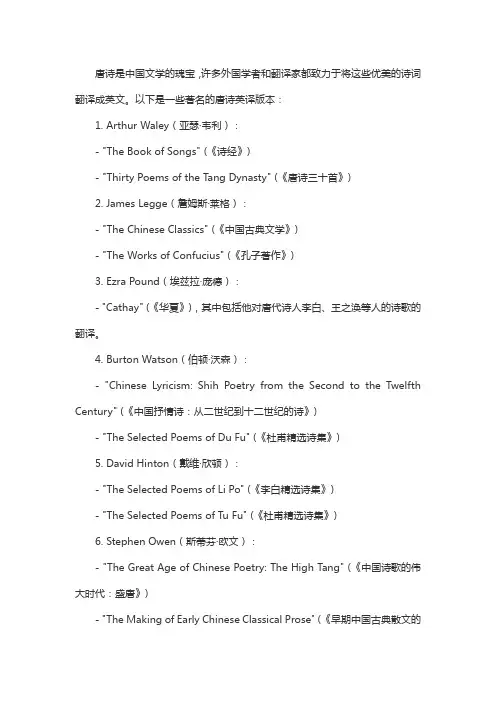
唐诗是中国文学的瑰宝,许多外国学者和翻译家都致力于将这些优美的诗词翻译成英文。
以下是一些著名的唐诗英译版本:1. Arthur Waley(亚瑟·韦利):- "The Book of Songs" (《诗经》)- "Thirty Poems of the Tang Dynasty" (《唐诗三十首》)2. James Legge(詹姆斯·莱格):- "The Chinese Classics" (《中国古典文学》)- "The Works of Confucius" (《孔子著作》)3. Ezra Pound(埃兹拉·庞德):- "Cathay" (《华夏》),其中包括他对唐代诗人李白、王之涣等人的诗歌的翻译。
4. Burton Watson(伯顿·沃森):- "Chinese Lyricism: Shih Poetry from the Second to the Twelfth Century" (《中国抒情诗:从二世纪到十二世纪的诗》)- "The Selected Poems of Du Fu" (《杜甫精选诗集》)5. David Hinton(戴维·欣顿):- "The Selected Poems of Li Po" (《李白精选诗集》)- "The Selected Poems of Tu Fu" (《杜甫精选诗集》)6. Stephen Owen(斯蒂芬·欧文):- "The Great Age of Chinese Poetry: The High Tang" (《中国诗歌的伟大时代:盛唐》)- "The Making of Early Chinese Classical Prose" (《早期中国古典散文的形成》)以上是几位在翻译唐诗方面有较高声誉的大家,他们的译本在国际上享有很高的声誉,并对西方读者了解和欣赏中国古典文学产生了深远影响。

Ezra Pound: CLASSIC ANTHOLOGY 诗经·国风·周南关雎关关雎鸠,在河之洲。
关关雎鸠,在河之洲。
窈窕淑女,君子好逑。
窈窕淑女,君子好逑。
参差荇菜,左右流之。
参差荇菜,左右流之。
窈窕淑女,寤寐求之。
窈窕淑女,寤寐求之。
求之不得,寤寐思服。
求之不得,寤寐思服。
悠哉悠哉,辗转反侧。
悠哉悠哉,辗转反侧。
参差荇菜,左右采之。
参差荇菜,左右采之。
窈窕淑女,琴瑟友之。
窈窕淑女,琴瑟友之。
参差荇菜,左右芼之。
参差荇菜,左右芼之。
窈窕淑女,钟鼓乐之。
窈窕淑女,钟鼓乐之。
Book I. C hou and the South Chou and the South I (1) [Hid! Hid! (1954)] Ezra Pound "Hid", "Hid" the fish-hawk saith, by isle in Ho the fish-hawk saith: “Dark and clear, Dark and clear, So shall be the prince's fere.” Clear as the stream is her modesty; As neath dark boughs her secrecy, reed against reed tall on slight as the stream moves left and right, dark and clear, dark and clear. To seek and not find as a dream in his mind, think how her robe should be, distantly, to toss and turn, to toss and turn. High reed caught in ts'ai grass grass so deep her secrecy; lute sound in lute sound is caught, touching, passing, left and right. Bang the gong of her delight. 静女静女其姝,俟我于城隅。
李白《长干行》,附:埃兹拉.庞德(Ezra Pound)英文翻译2008-08-07 20:49李白《长干行》,附:埃兹拉.庞德(Ezra Pound)英文翻译《长干行》李白妾发初覆额,折花门前剧。
郎骑竹马来,绕床弄青梅。
同居长干里,两小无嫌猜。
十四为君妇,羞颜未尝开。
低头向暗壁,千唤不一回。
十五始展眉,愿同尘与灰。
常存抱柱信,岂上望夫台。
十六君远行,瞿塘滟滪堆。
五月不可触,猿鸣天上哀。
门前迟行迹,一一生绿苔。
苔深不能扫,落叶秋风早。
八月蝴蝶来,双飞西园草。
感此伤妾心,坐愁红颜老。
早晚下三巴,预将书报家。
相迎不道远,直至长风沙。
The River-Merchant's -Wife:A letter-Ezra Pound 河上贾人妇:一封信While my hair was still cut straight across my forehead I played about the front gate, pulling flowers.Y ou came by on bamboo stilts, playing horse, Y ou walked about my seat, playing with blue plums. And we went on living in the village of Chokan: Two smallpeople,without dislike or suspicion.At fourteen I married My Lord you.I never laughed, being bashful.Lowering my head, I looked at the wall.Called to, a thousand times, I never looked back.At fifteen I stopped scowling, I desired my dust to be mingled with yours Forever and forever and forever.Why should I climb the look out?At sixteen you departed, Y ou went into far Ku-to-en, by the river of swirling eddies, And you havebeen gone five months.The monkeys make sorrowful noise overhead.Y ou dragged your feet when you went out.By the gate now, the moss is grown, the different mosses, Too deep to clear them away!The leaves fall early this autumn, in wind.The paired butterflies are already yellow with August Over the grass in the West garden; They hurt me.I grow older.If you are coming down through the narrows of the river Kiang, Please let me know beforehand, And I will come out to meet you As far as Cho-fu-Sa.Ezra Pound2009/09/03 11:02 P.M.你砍伐了新的木料现在是雕刻的时候了我们来自共同的浆液和根茎让我们结成同盟在地铁车站这几张脸在人群中幻景般闪现湿漉漉的黑树枝上花瓣数点合同我跟你订个合同惠特曼—长久以来我憎恨你我走向你一个顽固父亲的孩子已经长大成人了现在我的年龄已足够交朋友是你砍例了新的丛林现在是雕刻的时候了我们有着共同的树液和树根让我们之间进行交易舞姿为《加利利的卡纳的婚礼》而作呵黑眼珠的我梦想的妇人穿着象牙舞鞋在那些舞蹈的人们中没有人像你舞步如飞我没有在帐篷中在破碎的黑暗中发现你我没有在井边在那些头顶水罐的妇女中发现你你的手臂像树皮下嫩绿的树苗你的面孔像闪光的河流你的肩白得像杏仁像刚剥掉壳的杏仁他们没有让太监护卫你没有用铜栅栏护卫你在你憩息的地方放着镀金的绿宝石和银子一件黄袍用金丝织成图案披在你身上呵纳塔—伊卡奈河畔之树像流经苍苔间的潺潺溪流你的手按在我身上你的手指是寒冷的溪流你的女伴们白得像卵石她们围绕着你奏乐在那些舞蹈的人们中没有人像你舞步如飞少女树长进我的手心树叶升上我的手臂树在我的前胸朝下长树枝象手臂从我身上长出你是树你是青苔你是轻风吹拂的紫罗兰你是个孩子——这么高这一切世人都看作愚行为选择墓地而作的颂诗整整三年与他的时代脱了节他努力恢复那死去了的诗的艺术去维持雄浑本来的意义一开始就错了的—不不是但要知道他生在一个半野蛮的国家,落后有余总坚决地想要从橡树上拧出百合做攻城勇士装作鱼铒的鳟鱼“神令众人在特洛伊城受苦”没有堵塞的耳朵听见那歌声因此那一年仅给礁石留下少许余地海洋汹涌的浪涛把他载承他真正的爱妻是福楼拜他垂钓在顽固的岛屿旁边宁欣赏女妖赛西的秀发不愿遵从日晷上的箴言不受世事进展的影响他从人们的记忆中消失不过才三十多岁的年纪这个例子不会给缪斯的冠冕增添一分光彩1920普罗旺斯晨歌有如苍白湿润的铃兰凉凉的花瓣拂晓时她躺在我身边咏叹调我的爱人是深深藏在水底的火焰我的爱人是欢乐的亲切的我的爱人象水底的火焰难寻踪影风的手指给她带去脆弱的快速的问候我的爱人是欢乐的亲切的难于相逢象水底的火焰难于相逢白罂粟白色的罂粟花沉重地负载着梦我渴望着它们的唇瓣当我瞧见它们隐匿出没在阴影之中-它们是白色的-如果有人用她眼中古老的渴望瞧我我将如何回答她的眼色我已经追随森林中的白人是的,这是一次长的追寻这是一次焦渴当我看到它们在挺立的树丛中消逝忽隐忽现呵当爱情在心中熄灭人们何等悲痛使者去吧,天生无声的书告诉她唱一次罗斯*的歌给我听若要是你有歌就象你有知识一样你就能消除甚至我的错误那沉重的包袱并且给她的光辉带来长寿告诉她她将珍贵宝物投入空中一切都没有意义只有她的恩情使此时获得生命我将令它们活得象玫瑰,在魔术样的琥珀中红色泛出橙黄一切成为一种物质一种颜色藐视着时间告诉她她唇边带着歌声走开但没有唱出声也不知道作者是谁别的嘴唇可能和她的一样美丽可能在新时期夺取了她的崇拜者们当我们两人的骨灰和华洛**的一起洒下一层层埋在无声无息中直到变迁摧毁了一切只有美丽幸存诗章第49号赞七湖有佚名诗曰雨空江孤旅冻云中现一团火黄昏骤雨船篷下一盏孤灯芦苇沉沉弯弯竹林簌簌如泣秋月沿湖山耸浓弊锭暮似云帘笼涟漪而穿帘是月桂尖长的枝刺芦苇丛荡一支寒曲山后佛寺的钟声随风飘来四月逝帆十月归船溶入银波缓缓太阳独耀江上一竿酒旗揽斜阳斜光中几缕炊烟依稀忽有雪飞江上大地玉裹扁舟似灯笼摇荡流水凝寒而在山阴黎民悠悠自得大雁猝降沙洲云拢聚窗口水渺渺雁与秋并行渔火上空一片鸦噪光移北天际有数童掷石捕虾1700年康熙巡歇山湖畔光移南天际国屯富亦衰这会遗臭万年会为鬼怪大运河虽为昏帝享乐而掘可它仍流至通县卿云烂兮纠缦缦兮日月光华旦复旦兮日出而作日入而息掘井而饮耕田而食帝力于我何有哉第四度安宁的空间其威制伏野兽扇诗白绢扇啊纯洁如草上霜你也被搁置一边长干行By Libai那时我的头发齐齐留在额前梳着刘海我时常周旋于门前嬉戏采拮花草而你踩着高跷窃窃走来追戏着马儿绕着我的骑座走来走去玩着蓝梅子往昔我们一直同住在一个村庄哪儿叫丘康两个小小的人儿没有厌倦没有猜疑年方十四我嫁与了你我心中的神明我虽未笑过只是羞怯埋下我头颈凝视着墙壁任凭别人千呼万叫我亦纹丝不动年方十五我已不再愁眉苦脸我只希望把我的遗骨埋于你身旁永远永远永远为什么我还要左顾右望年方十六你就离去你奔向了遥远的库土曼蹚过涡流蹚过河川你已经离去整整五个月猴猿也发出了哀鸣昂起了头颅你跨出门时还拖曳着沉重的步子现在门旁长满了青苔有叶苔有角苔亦有溪苔萋深怎能驱走今年的枯叶落得这么早飘在空中落在地上蝴蝶伉俪也已透出了枯黄庄严地掠过草地飞过西花园它们厌恶我只因我已衰老假如你要来请走那祁安河请走那小径旁事先告知我那时我便会迎出门迎至曹松。
庞德的翻译观(总4页)本页仅作为文档骞面,使用时请直接删除即可- -内页可以根据需求调整合适字体及大小-庞德的翻译观摘要:埃兹拉庞德(ezra pound)乃美国著名诗人,意象派的代表人物,他翻译的中国古典诗歌对英语诗歌产生了重要影响,本文通过解析庞德的翻译理论和分析《华夏集》的译例,一窥他的创意翻译法,让大家领略不同于中国国内传统的翻译方法,并让读者认识到庞德的翻译作品带来的影响力远远超过翻译本身。
关键词:庞德;翻译观念;创意翻译法;中国古典诗歌埃兹拉庞德是英美20世纪文坛最有影响的人物之一,他集诗人、批评家与翻译家于一身。
埃兹拉庞德翻译了不少中国古典诗歌和儒家经典。
他的中国古典诗歌英译不但很好地介绍了中国文化,而且恰当地将中国诗学精髓用之于发展英语现代诗歌,同时又突出地表现了他的创意翻译法。
虽然庞德的诗学和翻译与中国文化的渊源很深,但国内对其诗学和译学的研究一直没有重大突破,甚至有不少人将庞德的翻译看作是劣质翻译品,本文试对庞德的翻译理论初作探讨,以期抛砖引玉,让庞德的翻译理论和译作在中国能够得到中肯的评价。
一、20世纪的翻译理论介绍20世纪以前的西方译论主要是围绕“直译”与“意译”展开,20世纪朝着哲学、语言学和文化三个主要方向发展。
庞德翻译理论对20世纪西方翻译理论的发展影响深远,预示着翻译理论从语言学范式到文化范式的发展方向。
二、庞德的翻译理论庞德翻译理论的核心在于创意翻译,而他的创意翻译又体现在如下三方面:(-)翻译是对原作的部分批评庞德1934年提岀“通过翻译批评”的观点。
庞德认为翻译是对原作的批评。
但与维多利亚翻译家“翻译即批评”的观点不同的是,庞德认为翻译是对原作的部分批评。
“庞德与维多利亚时期翻译理论的最根本的差别在于庞德不再现原诗的所有特征,无论其特征是理想还是不理想。
"(apter, 1984:106)庞德认为,翻译家不应着力重现原文所有的特征,而应向读者“展示原文的宝藏”,即展示原文的本质特征,展示原文独特的品质,哪怕是损失其他的品质,以传达原作者的思想意识及原作整体的美学效果。
庞德《诗章》英文Title: "Poems" by PoundIntroduction:If you"re reading this, you"re likely wondering what the hell I"m talking about. Well, I"m not exactly sure either. But I do know that Ezra Pound, one of the most influential poets of the 20th century, is often associated with the term "Poems." And that"s what this collection of his work is titled.Pound"s "Poems" is a sprawling,不规则的 collection of poems that spans a period of more than 30 years. Many of them are experimental and innovative, exploring new forms and techniques in poetry. Others are more traditional in style, and still others are a combination of the two.Regardless of their style, "Poems" by Pound contains a wealth of powerful and meaningful imagery, often focusing on themes of loss, love, and the human condition. His use of symbolism and metaphor is often profound, and his language is often highly complex and difficult to interpret.One of the most famous poems in "Poems" is "In a Station of the Metro," which was written during World War I and is known for its powerful imagery and poignant message. The poem describes a man who is waiting for a train in a busy station,and the brief encounter he has with a woman who passes by. Despite their brief interaction, the man is able to gain a sense of comfort and solace from the encounter, even as the world around him is falling apart.Pound"s "Poems" is a fascinating and complex collection of work, offering a unique and powerful perspective on the human condition and the power of poetry to convey meaning and inspiration.。
The Features of Ezra Pound's Vorticism Idea --An Analysis of Pound' s Translation "Among the
Flowers is a Pot of Wine"
作者: 马金苗
作者机构: 西安外国语大学,陕西西安710128
出版物刊名: 哈尔滨学院学报
页码: 119-122页
年卷期: 2015年 第5期
主题词: 漩涡主义;中国诗歌;动词;意象
摘要:埃兹拉·庞德不但是一位美国著名诗人,也是一位非常热爱中国诗的诗人,受中国古典诗歌的影响,他翻译的中国诗歌,摆脱了英国维多利亚时期的诗歌传统,开创了美国现代诗歌的先河。
庞德翻译诗歌的思想除了早期众所周知的意象主义思想外,还有后来他对意象主义思想进行修正,形成的漩涡主义思想。
漩涡主义思想的观点主要体现在以下三个方面:第一动词的使用,包括大量使用动词和避免使用表状态的系动词be;第二避免使用形容词等主观评论性词语;第三静态意
象和动态意象的使用。
文章通过对比分析庞德和英国汉学家Arther Waley英译李白的《月下独酌》,来说明庞德在翻译诗歌时的漩涡主义思想。
文章研究目的是说明中国古典诗歌对庞德漩涡主义思想形成的影响,以及庞德对20世纪美国现代诗歌创立所做出的巨大贡献。
庞德(Ezra Pound)诗选
庞德(1885-1972),意象派运动主要发起人。
第一次世界大战后,迁居巴黎。
二次大战期间他公开支持法西斯主义,战争结束后,他被美军逮捕,押回本土等候受审。
后因医生证明他精神失常,再加上海明威和弗罗斯特等名人的奔走说项,他只被关入一家精神病院。
1958年,庞德结束了12年的精神病院监禁,重返意大利居住,直至去世。
主要作品有《面具》(1909)、《反击》(1912)、《献祭》(1916)、《休·西尔文·毛伯莱》(1920)和《诗章》(1917-1959)等。
在地铁车站合同舞姿少女为选择墓地而作的颂诗普罗旺斯晨歌咏叹调白罂粟使者诗章第49号扇诗
在地铁车站
这几张脸在人群中幻景般闪现;
湿漉漉的黑树枝上花瓣数点。
(飞白译)
合同
我跟你订个合同,惠特曼—一
长久以来我憎恨你。
我走向你,一个顽固父亲的孩子
已经长大成人了;
现在我的年龄已足够交朋友。
是你砍例了新的丛林,
现在是雕刻的时候了。
我们有着共同的树液和树根一—
让我们之间进行交易。
(申奥译)
舞姿
为《加利利的卡纳的婚礼》而作
呵,黑眼珠的
我梦想的妇人,
穿着象牙舞鞋
在那些舞蹈的人们中,
没有人像你舞步如飞。
我没有在帐篷中,
在破碎的黑暗中发现你。
我没有在井边,
在那些头顶水罐的妇女中发现你。
你的手臂像树皮下嫩绿的树苗;
你的面孔像闪光的河流。
你的肩白得像杏仁;
像刚剥掉壳的杏仁。
他们没有让太监护卫你;
没有用铜栅栏护卫你。
在你憩息的地方放着镀金的绿宝石和银子。
一件黄袍,用金丝织成图案,披在你身上,
呵,纳塔——伊卡奈,“河畔之树”。
像流经苍苔间的潺潺溪流,你的手按在我身上;
你的手指是寒冷的溪流。
你的女伴们白得像卵石
她们围绕着你奏乐。
在那些舞蹈的人们中,
没有人像你舞步如飞。
(申奥译)
少女
树长进我的手心,
树叶升上我的手臂,
树在我的前胸
朝下长,
树枝象手臂从我身上长出。
你是树,
你是青苔,
你是轻风吹拂的紫罗兰,
你是个孩子——这么高,
这一切,世人都看作愚行。
(赵毅衡译)
为选择墓地而作的颂诗
整整三年,与他的时代脱了节,
他努力恢复那死去了的
诗的艺术;去维持“雄浑”
本来的意义。
一开始就错了的——
不,不是,但要知道他生在
一个半野蛮的国家,落后有余;
总坚决地想要从橡树上拧出百合;
做攻城勇士;装作鱼铒的鳟鱼;
“神令众人在特洛伊城受苦”
没有堵塞的耳朵听见那歌声;
因此,那一年,仅给礁石留下少许余地,
海洋汹涌的浪涛把他载承。
他真正的爱妻是福楼拜,
他垂钓在顽固的岛屿旁边;
宁欣赏女妖赛西的秀发
不愿遵从日晷上的箴言。
不受“世事进展”的影响,
他从人们的记忆中消失,不过才
三十多岁的年纪;这个例子
不会给缪斯的冠冕增添一分光彩。
1920
梁秉钧译
普罗旺斯晨歌
有如苍白湿润的铃兰
凉凉的花瓣
拂晓时她躺在我身边。
咏叹调
我的爱人是深深藏在
水底的火焰。
-我的爱人是欢乐的亲切的
我的爱人象水底的火焰
难寻踪影。
风的手指
给她带去
脆弱的
快速的问候。
我的爱人是欢乐的
亲切的
难于
相逢
象水底的火焰
难于相逢。
申奥译
白罂粟
白色的罂粟花,沉重地负载着梦,
我渴望着它们的唇瓣
当我瞧见它们隐匿
出没在阴影之中
-它们是白色的-
如果有人用她眼中古老的渴望瞧我,
我将如何回答她的眼色?
我已经追随森林中的白人。
是的,这是一次长的追寻
这是一次焦渴,当我看到它们
在挺立的树丛中消逝,忽隐忽现。
呵,当爱情在心中熄灭,
人们何等悲痛。
申奥译
使者
去吧,天生无声的书,
告诉她唱一次罗斯*的歌给我听
若要是你有歌
就象你有知识一样
你就能消除
甚至我的错误.那沉重的包袱,
并且给她的光辉带来长寿
告诉她,她将珍贵宝物
投入空中,
一切都没有意义,只有她的恩情
使此时获得生命
我将令它们活得
象玫瑰,在魔术样的琥珀中
红色泛出橙黄.一切
成为一种物质,一种颜色
藐视着时间
告诉她,她
唇边带着歌声走开
但没有唱出声,也不知道
作者是谁,别的嘴唇
可能和她的一样美丽
可能在新时期,夺取了她的崇拜者们
当我们两人的骨灰,和华洛**的
一起洒下,一层层埋在无声无息中
直到变迁摧毁了一切
只有美丽幸存。
*亨利·罗斯(1598-1662),英国作曲家。
**爱德芒·华洛(1606-1687),英国诗人,曾写《去吧,可爱的玫瑰》。
这首诗披庞德用作《使者》的模式。
郑敏译
诗章第49号
赞七湖,有佚名诗曰:
雨,空江,孤旅,
冻云中现一团火,黄昏骤雨
船篷下一盏孤灯。
芦苇沉沉,弯弯,
竹林簌簌如泣。
秋月;沿湖山耸
浓弊锭
暮似云帘,
笼涟漪;而穿帘
是月桂尖长的枝刺,
芦苇丛荡一支寒曲。
山后佛寺的钟声
随风飘来。
四月逝帆十月归,
船溶入银波;缓缓;
太阳独耀江上。
一竿酒旗揽斜阳
斜光中几缕炊烟依稀
忽有雪飞江上
大地玉裹
扁舟似灯笼摇荡,
流水凝寒。
而在山阴
黎民悠悠自得
大雁猝降沙洲,
云拢聚窗口
水渺渺;雁与秋并行,
渔火上空一片鸦噪,
光移北天际;
有数童掷石捕虾。
1700年康熙巡歇山湖畔,光移南天际。
国屯富亦衰?
这会遗臭万年;会为鬼怪。
大运河虽为昏帝享乐而掘,可它仍流至通县。
卿云烂兮
纠缦缦兮
日月光华
旦复旦兮
日出而作
日入而息
掘井而饮。